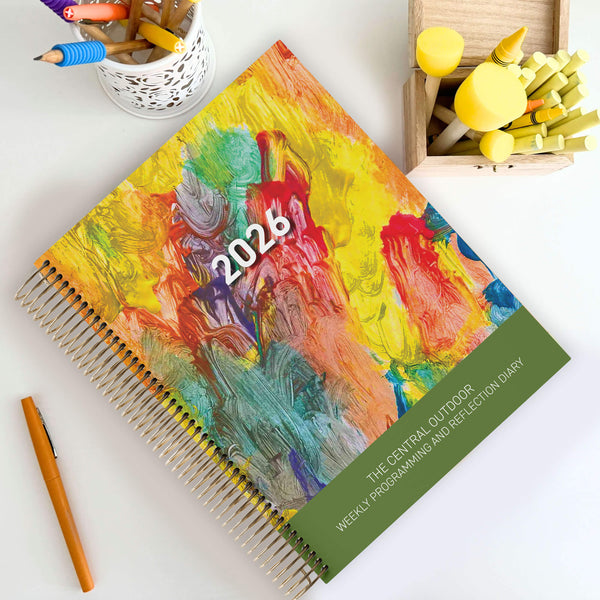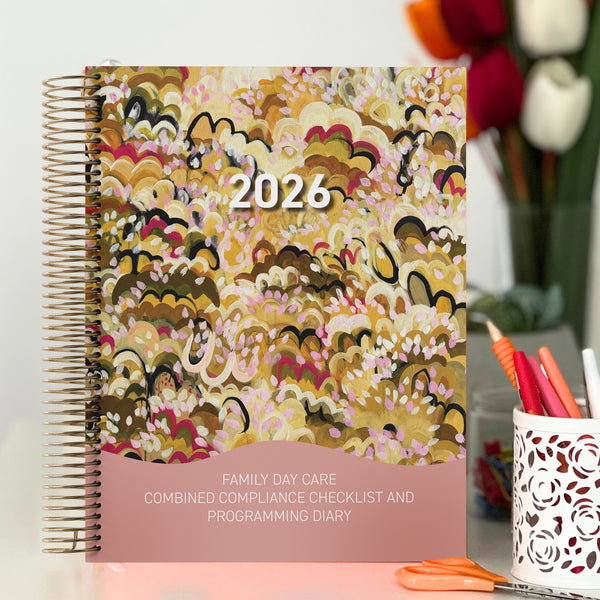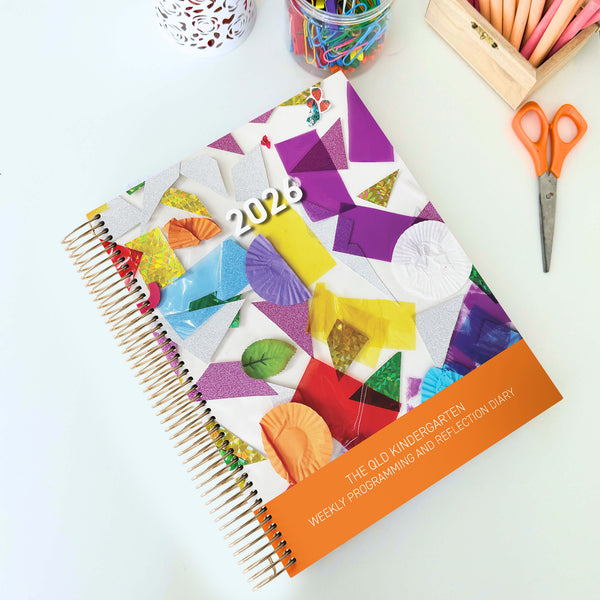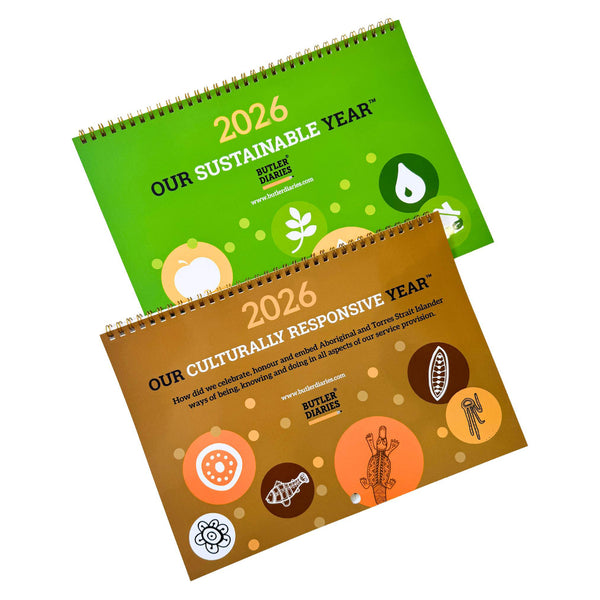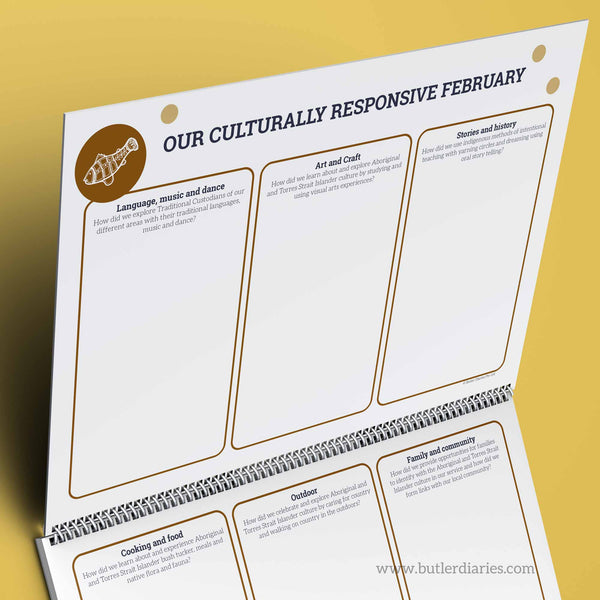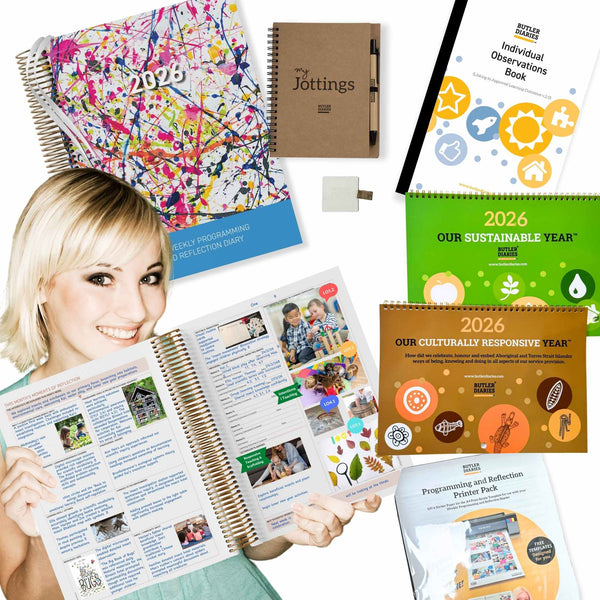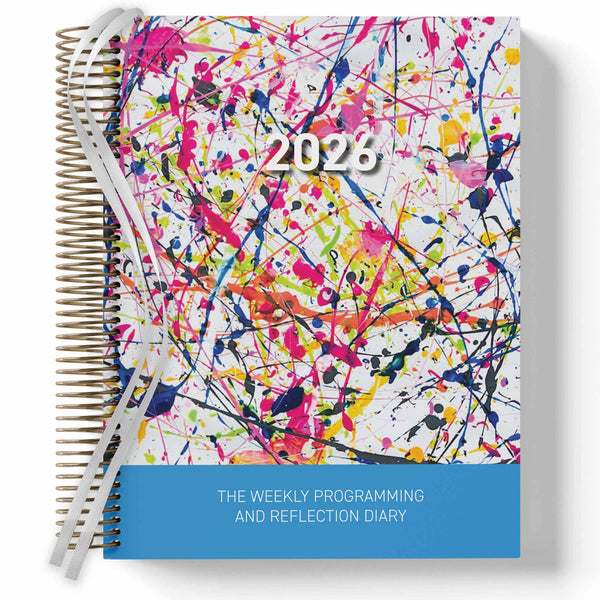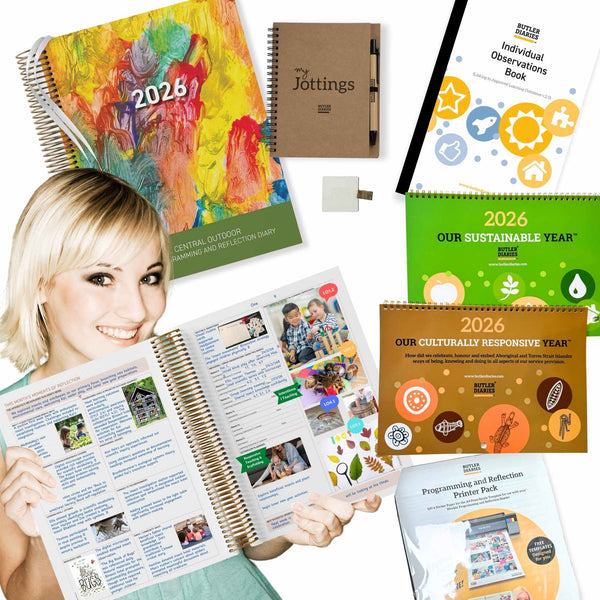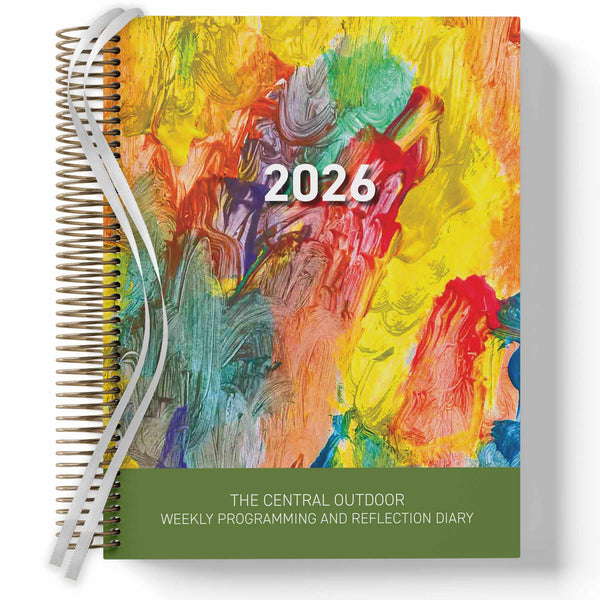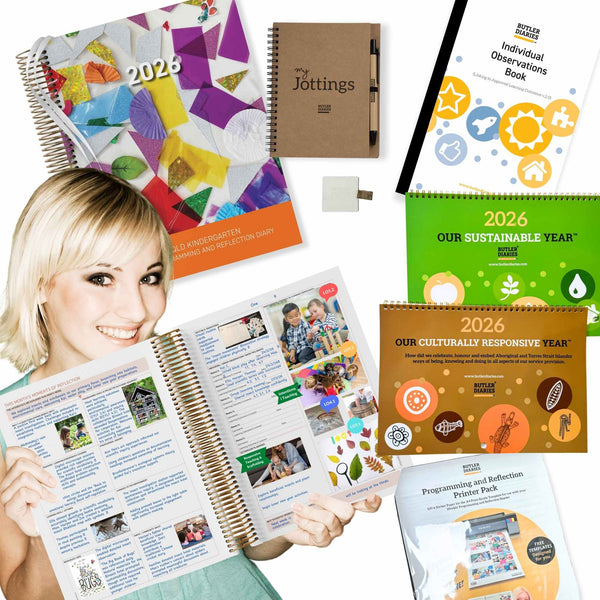So you’ve started (or are about to start) your Certificate III in Early Childhood Education and Care—and maybe you’re on to your Diploma or University Qualification. You’ve got your textbooks, your placements lined up, and now you’ve ordered some diaries and planner books from Butler Diaries.
If you’re wondering how to make the most of them while studying and on placement, this guide is for you.
Why Diaries and Planners are Game-Changers for ECEC Students
In ECEC, organisation is key. Between placement hours, assessments, classwork, and part-time jobs, your time gets stretched thin. Diaries and planners aren’t just about writing down shifts—they’re about:
-
Applying key practices linked to frameworks and regulations
-
Recording your reflections and observations for assessment tasks
-
Collecting evidence of your experience
-
Building habits now that you’ll use throughout your career
-
Having evidence of your professional growth for future job applications
You can also join our Butler Diaries Scholarship Program and receive 10% off tools and resources, free access to our entire training portal, and access to our exclusive Facebook support group. Butler Diaries also grants four $1,000 cash scholarships and four critical reflection scholarship packages each year.

Purchasing Guide: Which Diaries and Planners are Best for Students?
Here’s a breakdown of our most useful products for students and how each one fits into your study life. We highly recommend starting with at least 1-6 and using the other resources depending on your experience, confidence, and areas of focus.
1. Educator Planner
Perfect for: Managing your study, your assessments, due dates, placement, tasks, and progress, all in one place.
Why it's great for students:
- Helps you stay on top of your due dates and course obligations,
-
Fosters skills and habits in goal setting and reflection,
-
Supports your wellbeing during a busy and often stressful period in your life,
- Reduces mental load across your study, work, and home life.

2. Programming and Reflection Diary
Perfect for: Placement, those working while studying, and assessment tasks that require you to plan and reflect on activities.
Why it’s great for students:
-
You’ll learn to program the same way qualified educators do—great for developing skills early.
-
Includes sections for spontaneous choices, family input, and reflections, all of which line up with your training requirements.
- Helps support you to show the cycle of planning and link to Frameworks.
- Includes a support network - customer-only Facebook Group, support articles, programming diary help, eBook of examples, and free and paid training options.

3. EYLF/MTOP Highlighter and EYLF/MTOP Banner Pen
Perfect for: Linking your observations, plans, and reflections to the correct learning outcomes.
Why it’s great for students:
-
Speeds up your documentation process by letting you quickly identify relevant outcomes from the EYLF or MTOP.
- Helps you see links to frameworks and build the cycle of planning through consistent colour coding.
- Helps others see links and the cycle of planning.
- Can be used across different documentation styles to create a consistent colour coding system.
- Ideal for jotting down observations, programming notes, or reflections during placement.
- Helps you learn and become familar with frameworks.

4. Programming and Reflection Printer Pack
Perfect for: Students using the Programming and Reflection Diary and would like to streamline photo evidence with a digital template.
Why it’s great for students:
-
Simplifies and speeds up the process of including photo evidence in your Weekly Programming and Reflection Diary.
- Collects another form of evidence (photo documentation) to show the cycle of planning.

5. Individual Observation Duplicate Book
Perfect for: Recording observations that you can keep and share.
Why it’s great for students:
-
The duplicate pages allow you to keep one copy for your portfolio while leaving another for your placement service.
-
Saves rewriting the same observation for different purposes.
- Helps you plan for child-led experiences in your Weekly Programming and Reflection Diary.
- Its simple format, with evaluation and links to frameworks, helps you practice core principles of planning and supports you in learning how to record observations.
- Collects another form of evidence (individual observations) to show the cycle of planning.

6. Trainings & Professional Development
Perfect for: Building your skills while you study and showing initiative on placement and during work.
Why it’s great for students:
-
Our training portal includes free tutorials, plus paid diary guides and advanced PD that aligns with industry expectations.
-
Great for adding to your resume and placement evidence file.
- Supports you in using all the above resources effectively.
You have free access as a student when you join our Butler Diaries Scholarship Program. You'll also receive 10% off tools and resources and access to our exclusive Facebook support group. You also have the opportunity to be granted one of four $1,000 cash scholarships or one of four critical reflection scholarship packages each year.

7. Jottings Pad and Notebooks for Behaviour Notes
Perfect for: Quick observations on the go during placement. Documenting behavioural patterns or incidents for case studies or assignments. The Weekly Programming and Reflection Diary is designed to be shared with families, and the Notebooks and Jottings Pads are the perfect space for more confidential and sensitive records.

Why it’s great for students:
-
Fast, no-fuss way to take notes without losing details before you can write a full observation.
- Jottings are another valuable source of documentation that is perfect to learn and fits in with the fast-paced environment of ECEC.
-
Keeps records neat, private, and professional—important when working in real-life settings.
- It is a separate space that maintains the confidentiality and privacy of children and families and can be shared with other staff members where appropriate.
8. Amazing Year Portfolio
Perfect for: Building a showcase of your work and learning across placement blocks or during your work day.
Why it’s great for students:
-
Helps you collect and present evidence for assessments.
-
Gives you a way to engage and collect observations on children.

9. Children’s Voices Diary
Perfect for: Capturing direct quotes and input from children during placement or work.
Why it’s great for students:
-
Many assessment tasks require you to show how you include children’s voices in planning—this diary gives you a clear record to use in your assignments.
- It's a new and different way to collect children's input and can benefit the centre's program and documentation too.
- A beautiful tool to share with families.

10. Special Interest Calendars
Perfect for: Highlighting key cultural or sustainability practices, events, and themes.
Why it’s great for students:
-
Helps you integrate meaningful events into programming during placement or work.
-
Doubles as a planning reference for your assignments.
- Highlights your commitment to key themes in EYLF and MTOP V2.0.

Tips for Using Your Diary Effectively as a Student
Here’s how to set yourself up for success from day one.
1. Make It Your Study Hub
Don’t separate placement from study from work from life in your Educator Planner—keep all your commitments in one place. Include:
-
Assessment deadlines
-
Class schedules
-
Placement rosters
-
Study blocks
2. Use the Reflection Sections for Your Assignments
Use your reflection spread in the Programming Diary as a tool to:
- Jot down notes that you can expand into assessment answers later. You’ll thank yourself when your trainer asks for specific examples.
- Critically reflect on your practice and build skills in this area - it is vitally important for good practice and the cycle of planning.
- Note down and reflect on professional conversations with other team members in the professional inquiry section

3. Capture Real-Life Evidence
During placement, write down:
-
Direct quotes from children
-
Experiences you observed and planned
-
Any resources used and how children responded
-
Notes from educator mentors
These details make your assignments stronger and more authentic.
4. Include Mentoring Notes, Reminders, and Inspiration
Capture specific notes on a topic, feedback from a mentor, ideas and inspiration, or your own reflections and notes. In Cognitive / Language, you may make a note that the lead Educator uses developmental milestones to help plan cognitive and language experiences based on children's goals. You may then use your Educator Planner to set a goal for yourself to improve the use of developmental milestones in your planning.
5. Review Weekly
End each week by:
-
Checking what’s due next
-
Reviewing what worked well at placement or during work
-
Noting any questions to ask your trainer or workplace mentor
- Critically reflecting on your practice and setting goals for yourself
Direction for Diploma Students
If you’re moving into your Diploma or Degree, keep building the habit of professional documentation. You’ll be expected to take more initiative in programming and reflections, so your diary becomes a training tool and an evidence folder.
Pro tip: When you apply for jobs, bring your diary or portfolio to interviews—it’s proof that you’re organised, reflective, and serious about the role.
Butler Diaries Scholarship Program
As a scholarship student, you receive:
- 10% off tools and resources,
- free access to our entire training portal, and
- access to our exclusive Facebook support group.
Butler Diaries also grants four $1,000 cash scholarships and four critical reflection scholarship packages each year.
You can gain access to the above student scholarship by registering at Butler Diaries Scholarship Program.
Final Words for Students
Whether you’re brand new to ECEC or moving from Cert III to Diploma, using your Butler Diaries products to their full potential can make your study life more organised and your assignments stronger.
Think of your diary as more than a planner—it’s your professional toolkit in training.









